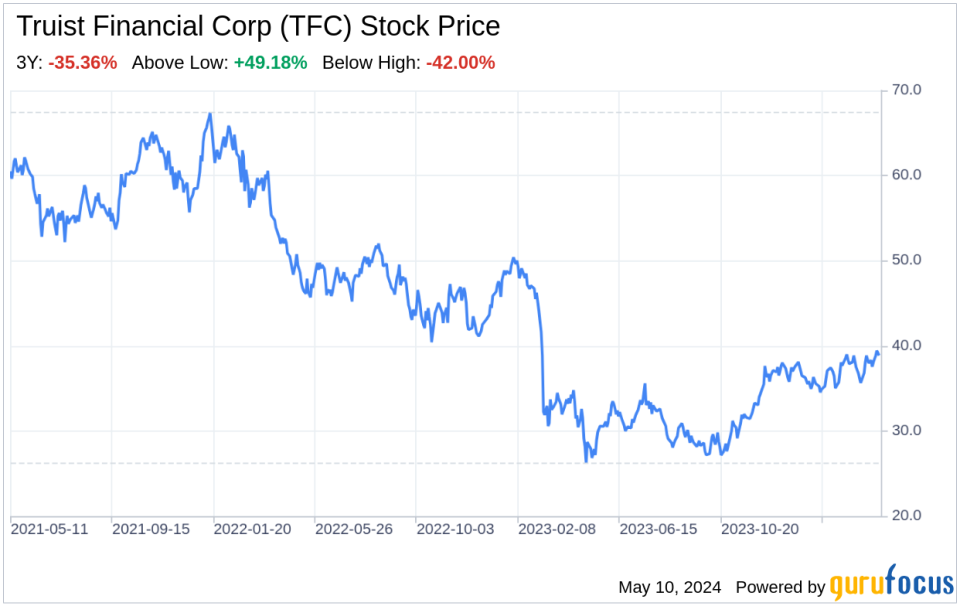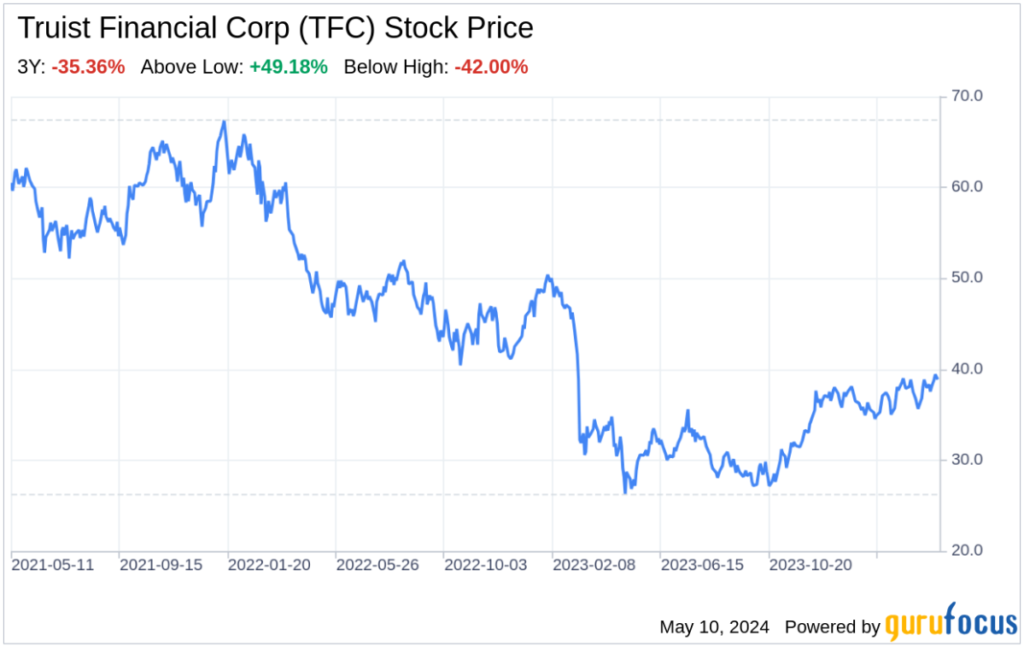-
Truist Financial Corp. shows strong net interest income despite market challenges.
-
Strategic realignment and divestiture opportunities to increase focus on core segments.
-
Legal proceedings and regulatory oversight pose a potential threat to financial stability.
-
With strong capital ratios, Truist Financial Corp. is well-positioned for regulatory compliance and future growth.
Truist Financial Corp (NYSE:TFC), a leading financial institution headquartered in Charlotte, North Carolina, released its 10th quarter report on May 9, 2024. This SWOT analysis delves into the company's financial performance and strategic position based on the latest SEC. Submission. Founded through the merger of BB&T and SunTrust, Truist operates primarily in the Southeastern United States and provides a wide range of commercial, retail and investment banking services. The company also has a significant non-bank division, primarily focused on insurance brokerage business. Financial overview for the first quarter of 2024 shows net interest income of $3.372 billion, down slightly from $3.867 billion a year ago, and net income of $1.2 billion compared to $1.515 billion in 2023. It becomes. Despite these fluctuations, Trust continues to perform well. The financial base shows a strong capital base with a CET1 ratio of 10.1%.


Strengths
Brand and Market Presence: Truist Financial Corp benefits from a strong brand presence and loyal customer base in the Southeastern United States due to the successful merger of BB&T and SunTrust. The company's established market presence is reflected in his significant net interest income of $3.372 billion in the first quarter of 2024, despite a competitive banking environment. This strength is extremely important as it provides a stable foundation for revenue generation and customer retention.
Capital adequacy: Truist's capital adequacy ratios remain strong, with a CET1 ratio of 10.1% as of March 31, 2024, which is consistent with the prior quarter and significantly increases regulatory requirements for well-capitalized banks. exceeds. With this strong capital base, the Trust can absorb potential losses, invest in growth opportunities, and provide shareholders with the ability to invest through dividends, such as his $0.52 per share common dividend declared in the first quarter of 2024. can return value to
Weakness
Decrease in net income: Trust's net income decreased from $1.515 billion in the first quarter of 2023 to $1.2 billion in the same period in 2024. This decline in profitability can be attributed to a variety of factors, including market volatility and increased competition. Affects investor confidence and a company's ability to attract new business.
Legal and Regulatory Challenges: The Company faces legal proceedings, including Bickerstaff v. SunTrust Bank, in which potential class-wide damages and pre-judgment benefits are estimated to be significant. Additionally, as stated in the filing, regulatory oversight can lead to increased compliance costs and impact a company's reputation and financial performance.
opportunity
Strategic Realignment: Truist is undertaking a strategic realignment, including renaming and realigning its operating segments, which may result in more focused and efficient operations. The realignment of our Wealth business into Wholesale Banking and the separation of Small Business Banking customers into Consumer and Small Business Banking may provide opportunities for enhanced service offerings and revenue growth. there is.
Divestiture and Capital Deployment: TIH's stock sale represents a significant strategic shift, allowing Truist to focus on its core segments. Successful utilization of the proceeds from this sale could lead to new investments, acquisitions or stock repurchases, contributing to stockholder value and the Company's long-term strategic objectives.
threat
Interest Rate and Market Risk: As a financial institution, the Trust is significantly exposed to interest rate risk. Changes in interest rates can affect your net interest income and the economic value of your shares. The Company's interest rate risk management is important in mitigating the potential adverse impact on its financial performance.
Reputational Risk: Ongoing legal proceedings and potential adverse outcomes threaten Truist's reputation. The company's ability to effectively manage these risks and maintain public trust is critical to maintaining its market position and ensuring continued engagement with its customers.
In conclusion, Trust Financial Corp. (NYSE:TFC) exhibits solid financial fundamentals with a strong market presence and strong capitalization, and is well positioned for future growth. However, the company must overcome challenges such as declining net income and regulatory pressures. Strategic restructuring and divestitures offer intensive growth opportunities, but interest rate fluctuations and reputational risks remain potential threats. Truist's ability to leverage strengths, address weaknesses, capitalize on opportunities and mitigate threats will be critical to the company's future efforts.
This article created by GuruFocus is intended to provide general insight and is not intended as financial advice. Our commentary is based on historical data and analyst forecasts using an unbiased methodology and is not intended to serve as specific investment guidance. It does not constitute a recommendation to buy or sell stocks, and does not take into account your individual investment objectives or financial situation. Our objective is to provide fundamental data-driven analysis over time. Please note that our analysis may not incorporate the latest announcements or qualitative information from price-sensitive companies. GuruFocus has no position in the stocks mentioned herein.
This article first appeared on GuruFocus.


